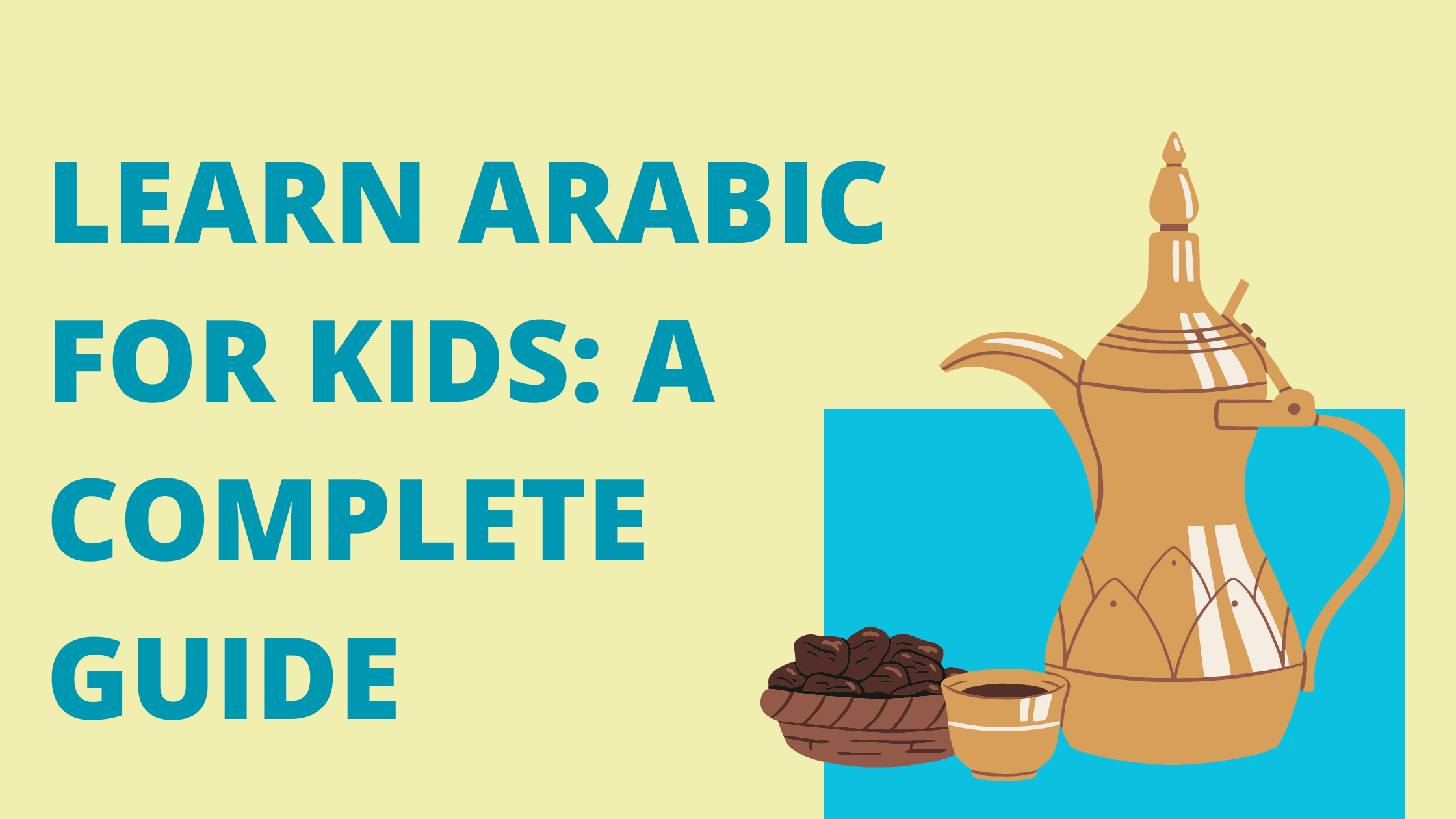Learning Arabic for kids opens doors to rich culture and profound religious understanding. Starting early is like engraving knowledge on a stone. Essential for understanding the Quran and practicing Islam, Arabic also enriches communication skills.
Use fun methods like flashcards, stories, and online apps. Parents can actively teach through interactive games and storytelling. Begin early for the best results and watch your child unlock a world of knowledge and faith!
As one of the richest languages of mankind, with such a precious knowledge, and distinctive culture, for sure, learning Arabic for kids will consequently deepen their insight, and bless them with life-changing knowledge.
“Learning at a young age is like engraving on a stone“- that Arabic proverb indicates how fixed in mind the knowledge learnt at a young age can be; the earlier you get your child to learn, the more understanding you can allow him to enjoy in life!
Table of Contents
What Is Arabic For Kids Learning?
Arabic for kids learning refers to the educational programs, resources, and methods specifically designed to teach the Arabic language to young learners.
They may include both online and offline resources, such as mobile apps, educational websites, workbooks, and classroom-based instruction.
Is Learning Arabic Important for Kids? Why?
Of course, it is important for kids to learn Arabic, which is one of the most famous, needed languages around the world. this importance manifests in the high demand of many Arab families on Arabic courses for kids.
1- The Language of Islam:
Arabic is the main language of Islam- Qur’an, Sunnah, and all the other derived, clarifying Islamic studies, as well as the whole Arabic culture, and knowledge in all other fields.
2- Prerequisite for Muslim Kids:
As a Muslim kid, learning Arabic is prerequisite to be a practicing Muslim, as it is the language which The Creator chose to reveal Qur’an in; Allah Almighty says: [Indeed, We have sent it down as an Arabic Qur’ān that you might understand.] [Yususf: 2], as well as the Prophet’s Sunnah, and the rest of all the Islamic studies.
3- Significant for Understanding the Quran:
Reciting Qur’an- that is in Arabic- is a commanded act of worship: [… and recite the Qur’ān with measured recitation.] [Al-Muzzammil: 4], and, undoubtedly, understanding it well enough to keep being reminded, and acting accordingly, then: [a blessed Book which We have revealed to you, (O Muḥammad), that they might reflect upon its ayahs and that those of understanding would be reminded.] [Sad:29]
4- Essential for Worship and Supplication:
In addition, Qur’an- only in Arabic- is a must to perform other acts of worship, too, like salat, and also, for other purposes like Ruqyah, and dua (cure by Qur’an, and supplication).
5- Understanding Allah’s Message:
Last and not least, Qur’an is Allah’s Word sent down to His servants to know Him, and their purpose of life; to guide them to the right way; of course, we need to learn its original language to fully understand His message sent to us! Besides the fact that the Qur’an, in Arabic, is like the roots of the whole Islam tree!
Challenges of Learning Arabic, and How to Overcome Them:
Undeniably, There are always challenges to face in the learning process, generally, like a baby trying hard to stand on his feet to walk! As everything else in life, knowledge comes with a price, which is perseverance.
Arabic is really such a unique, diverse, deep language with rich heritage, and matchless eloquence. It is so great that The Creator chose it specially to be the original language of His Holy Book, Qur’an.
Here, let’s shed lights on some of the common challenges that your kid may face, while learning Arabic, and how to overcome them:
| Challenges | To Overcome |
| 1- Distinction Between Standard Arabic and Dialects:Standard Arabic is distinct from the various, actual dialects spoken in many Arab countries. While Modern Standard Arabic (MSA), is the formal version of the language used officially, the dialects are the colloquial forms spoken in everyday life by people in different regions. | Decide which to focus on learning first, according to your target, whether communicating in a certain Arab country, or learning the standard Arabic for understanding Qur’an, first. |
| 2- The Arabic Writing Is Different from That of English:Arabic is written, and read from right to left, unlike English. Moreover, the letters’ shapes are different, when written separately, than when written linked together, to form a word. Some letters are similar and is easily mixed up, like ر،ز_ ط، ظ : a single dot can change the whole letter, and in turn, the meaning, and usage! In addition, some letters are exclusive to Arabic, like ض, (dhaadh). | To overcome this, you should let your kid learn the Arabic letters separately first, one by one, so that he can recognize them, with their own shape, and pronunciation. Then, practice, with flashcards, some common, simple words, where the Arabic letters are linked together.You can also show your kid a clear-cut comparison of the mixed-up letters, like ت، ث to enable him to differentiate between them, in writing and pronouncing, with simple examples.It’s also important to let him practice the Arabic-special letters, as they are brand new to him, and how to write and pronounce them. |
| 3- Arabic Vocabulary Is Really Numerous and Detailed: For each shade of meaning, there are various synonyms. On the other hand, the same terms can be used in various contexts, with different meanings. | Let your kids firstly focus on the most common, needed words, while learning, to understand them well, and then, to get ready for the next.Furthermore, let him determine a certain number of new words to learn and practice, daily, considering their contextual meanings, too; that will accelerate his learning process. |
| 4- Arabic Grammar Is Crucial, Branched, and Tricky: Arabic grammar can be a bit tricky and difficult to comprehend, at first. Nevertheless, learning Arabic cannot be without it; it’s the spine of the language.Arabic has nominal phrases, verbal phrases, and imperatives, etc., as well as different tenses, and definite and indefinite marks, and so on. | The best way to get the Arabic grammar right, is to seek the help of an Arabic-native, really qualified teacher, so that he can teach your kid ‘how to’ decipher the Arabic sentence correct grammatically; that, in turn, let him unlock its right usage, and meaning easily, then. |
| 5- Arabic Is Such a Weighty Language that Requires Regular Practice with Arab-Natives: The complexity and richness of Arabic, with its unique script, extensive vocabulary, and intricate grammar rules, make it a language that cannot be mastered through textbooks alone. Engaging with native speakers allows learners to immerse themselves in the authentic use of the language, picking up nuances, idiomatic expressions, and cultural context that are essential for fluency. | ‘Practice makes perfect’, as they said; let your kid constantly communicate, in pure Arabic, with his Arab teacher, and other Arab kids, if possible, to get him familiar with the Arabic language.If there are no Arab fellows around, let your kid join Arabic-speaking courses, where he can learn so much by talking in Arabic, and get used to speak Arabic, in daily life-situations. |
| 6- Arabic-Learning Journey May Seem Too Long, and Tough, Sometimes:The initial stages of learning the script, mastering the pronunciation of unique sounds, and understanding complex grammar rules can be daunting. The sheer volume of vocabulary and the existence of various dialects add to the challenge. However, despite these difficulties, the rewards of learning Arabic are immense. | Always remind your kid: ‘no effort, no result’! Constantly support him, by choosing a qualified Arabic teacher, for him, who can make his learning clearer, faster, easier, and even more fun!Celebrate even his small steps of learning, to keep him motivated for the next. Keep reminding him that learning Arabic enables him to understand Allah’s Word to him, and to get near to his Lord, and that is the ultimate success, in this life, and the hereafter! |
How to Learn Arabic for Kids? (General Tips and Tricks):
To learn Arabic, kids edition, parents and tutors alike are recommended to infuse a number of tips in their teaching techniques, so they can achieve the utmost results with each class. The methods to teach Arabic to kids include:
1- Ignite Passion and Curiosity:
Spark your kid’s passion and curiosity about the Arabic language, culture, and the whole knowledge that can be unlocked by learning this great language!
2- Start with Simple Words and Phrases:
Let him start with simple words, or common, Arabic phrases to communicate, like مرحبا (Marhabbah!) Hello!
3- Use Flashcards and Stories:
Show him flashcards, and interesting, short stories, with clarifying pictures to make his learning process fun, and engaging.
4- Utilize Online Learning Apps:
There are various online, Arabic-learning apps that can provide a fun, and interesting practice of the language, regularly, specially made for kids.
5- Immerse in an Arab Group:
Immersing in an Arab group of other kids can accelerate the kid’s communicating familiarly, in Arabic.
6- Join a Trusted Academy:
Let your kid join one of the well-known, trusted Arabic-learning academies, where he can be guided professionally by Arabic-native, knowledgeable teachers, and follow a comprehensive, learning plan.
7- Encourage and Celebrate Progress:
Keep encouraging your kid and celebrating his progress, even the smallest!
How to Learn Arabic for Kids at Home?
Nowadays, you can learn so much online, while sitting comfortably in your own room! So, simply, you can do that, too, with your kid, when learning the Arabic language.
1- Use Interactive Learning Apps:
Let your kid sign in a known, Arabic-learning, fun app, so that they can constantly keep the learning track, and communicate with native Arabic-speakers.
2- Join Online Arabic Classes:
Let your kid join a trustworthy Arabic-learning academy, so that he can be in the good hands of native, professional Arabic-teachers, and engage with them all along his learning journey.
3- Watch Arabic Educational Videos:
There are many educational videos available on platforms like YouTube that teach Arabic through songs, stories, and interactive lessons. Channels like “Little Thinking Minds” and “Learn with Zakaria” offer a variety of content that caters to young learners.
4- Engage in Arabic Language Games:
Games that involve matching words to pictures, completing puzzles, or engaging in role-playing scenarios can help reinforce language skills while keeping kids entertained and motivated.
Can I Teach My Child Arabic Myself?
Yes, you can teach your child Arabic yourself, even if you’re not a native speaker. With dedication, the right resources, and a structured approach, you can create an effective and enjoyable learning experience for your child.
There are many cases in which parents were able to successfully teach their kid Arabic, and more cases in which the assistance of a parent in the educational process through exercise and fun activities were the fuel to the kid’s progress.
How do I teach my child Arabic?
It is common for parents to be a part of their kid’s educational journey, and they have an important role in the continuity, progress, and completion of this journey. They usually resort to some activities that don’t only qualify as a second lesson, but also qualify as a fun quality time with their young ones.
1- Sing Nasheeds Together:
Firstly, start drawing your kid’s attention to the beauty of the Arabic language, by short, melodic, Arabic-learning nasheeds, and so on. Singing always makes things easy!
2- Colorful Flashcards:
Buy for your kid, big, colorful flashcards with clarifying pictures and letters combined, and start a song about each letter, along with showing its card to fix it in his mind.
3- Storytelling:
Bring him many, interesting, fun stories with full-page pictures, and read them together as a part of your daily routine.
4- Simple Phrases:
Use simple, daily-communication phrases with your kid regularly to get him familiar with them, and ready for learning more.
What Age Should Kids Learn Arabic?
‘The earlier, the better’; actually, in the first seven years of the kid, his mind is like a sponge that can astonishingly absorb most of the knowledge received. At that time, the child’s brain keeps growing, and developing, better than any other phase of his life. So, learning any cognitive skill, like languages, can be optimal at that time.
So, if you can get your kid taught the Arabic language during those early years, it would be great and so promising! Definitely, your kid will grow, with a broader mind, deeper insight, and wider knowledge, as well as, with a good, right understanding of Arabic, and Islam, that , in turn, saves so much time, and effort, than the older others.
Can a 13-Year-old Learn Arabic?
Of course, he can! Anyone, at any age, is never too old to learn! Actually, “Learning is a life-long process”. However, learning a new language at that age may require more consistency, diligence, time-dedication, and awareness of one’s own learning pace, and capacity.
Making progress in learning any new skill differs from one to another, of course; some are naturally quick-learners, while others need to take their time to get familiar with that new, complex, weighty language, Arabic. So, no matter the age of your kid, he can take his learning steps firmly, as long as he follows a compressive, precise, learning-plan that keeps him taught right.
How to Track My Child’s Progress in Learning Arabic?
There are two methods to track your child’s progress in learning Arabic, and choosing the right method depends solely on your choice of educational path:
1- Measuring your kid’s progress yourself:
In the case that you are teaching your kid Arabic, at home, just with the help of Arabic-learning, online apps, videos, or games, then, you can recognize the progress your kid reaches, by attentively interacting with him, in Arabic, and how much he already speaks, writes, and understands in Arabic, and the score, or the level he reaches in the Arabic-learning apps he has joined.
2- Signing your kid up for one of the Arabic-learning, online Academy:
In the case that you prefer your kid’s joining to a trusted, online academy where you kid can be in the good hands of professional Arabic-native teachers, then, you can simply ask for a precise follow-up report of your kid’s learning level, along with the regular evaluations that he already has to pass, throughout the course.
What Is the Subject Suitable for the Child Age to Learn in Arabic?
The subject matters that you introduce to your kid differ and change to suit their age and their mental and cognitive skills:
1- Early Childhood (Ages 2-4):
At this age, focus on introducing basic vocabulary and alphabet recognition. Simple words such as family members, colors, and animals are ideal starting points. Use songs, flashcards, and colorful charts to teach the Arabic alphabet.
2- Preschool (Ages 4-6):
In this stage, expand the child’s vocabulary to include more nouns, verbs, and adjectives related to everyday life. Teach simple sentence structures, such as “I want…” (أريد…). Introduce short, illustrated stories to enhance vocabulary and comprehension. Begin writing the Arabic letters through tracing activities to develop writing skills.
3- Early Elementary (Ages 6-8):
Start reading short, simple texts and stories to build reading skills. Introduce basic grammar concepts, such as singular and plural forms and simple verb conjugations. Encourage simple conversations about familiar topics like family, school, and hobbies. Use audio stories and educational videos to improve listening comprehension.
4- Late Elementary (Ages 8-10):
Focus on more advanced reading and writing skills. Have the child read more complex stories and passages and practice writing short paragraphs and simple essays. Teach more detailed grammar rules and structures while expanding their vocabulary with thematic word lists.
5- Preteens (Ages 10-12):
At this age, encourage comprehension and analysis of longer texts and stories. Advanced writing skills should be developed by writing essays, letters, and summaries. Study more complex grammar rules and sentence structures, and engage in more sophisticated conversations on various topics to achieve conversational proficiency.
Learn Arabic Online With Bayan al-Quran Native Arab Tutors:
Embark on a transformative journey of Arabic learning with Bayan Al-Quran’s comprehensive online Arabic courses. Our platform offers an authentic and immersive experience tailored to learners worldwide. Whether you’re a beginner or seeking to enhance your skills, our Tajweed courses provide expert guidance and structured learning to master Arabic learning.
🎓 Expert Guidance:
Benefit from experienced instructors who specialize in Arabic, breaking down complex rules into manageable segments for learners of all levels.
✨ Key Features:
- Structured, step-by-step learning approach.
- Access to high-quality instructional materials.
- Real-time feedback from qualified tutors to enhance your practice.
- Flexible learning schedules to accommodate your pace and convenience.
- Immerse yourself in the melodious tones of Quranic recitation, enriching your spiritual experience.
🌟 Why Choose Bayan Al-Quran?
Join our vibrant community dedicated to perfecting Arabic learning. Choose Bayan Al-Quran for a transformative learning experience and embark on a path to mastering Arabic with confidence.
Learn with Bayan al-Quran with Native Arab tutors. There are also several courses that can help you in this regard.
Conclusion:
Learning Arabic for kids can provide deep cultural and religious insights, especially given Arabic’s significance in Islam. Early learning is beneficial, as children absorb knowledge like “engraving on a stone.”
Arabic for kids includes various resources like apps, websites, and classroom instruction. Key reasons for learning Arabic include understanding the Quran, performing Islamic worship, and engaging with Arabic culture.
Despite challenges like distinguishing between dialects and mastering unique grammar and vocabulary, consistent practice and support from native speakers can facilitate learning. Tips for effective learning include using flashcards, online apps, and joining trusted academies.
Parents can actively participate by using interactive methods like storytelling and educational games, and the learning process should start as early as possible.
There are no ifs and buts about the great importance of learning Arabic, nowadays! It is such a needed, powerful language that enables your kid to discover a whole, distinctive world of knowledge, and intellect!

















